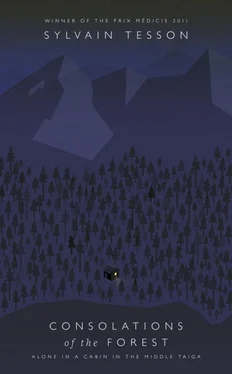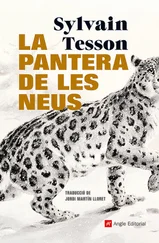Sergei joins me and we talk about the people – English, Swiss, German – who visit the lake in the summer.
‘I love the Germans,’ says Sergei.
‘Ah, yes: the philosophy, and their music…’
‘No, the cars.’
In the evening, by my bed, I light a candle for the icon of Seraphim of Sarov that I carry with me everywhere. And I write on a piece of paper, which I place before the image, this passage written by Jünger and dated December 1968:
In the sky, clouds were passing in front of the livid moon around which, at that moment, an American crew was orbiting. When I place a candle on a tomb, it has no effect, but its message is a rich one. It burns for the entire universe, confirming its meaning. If the astronauts circle the moon, the effect will be considerable, but the meaning of less account.
Next, to reward myself for having sent a sign to the universe, I down two and a half litres of beer. This relaxes my legs no end.
13 MARCH
I had a clutter of weird dreams last night. Never happens in Paris. The standard explanation would hinge on the quality of my sleep, conducive to hallucinatory fantasizing. I tend towards the idea that the genius loci visits me secretly at night and, shining softly into the arcana of my psyche, shapes the substance of my dreams.
At dawn, a car from Irkutsk brings good old Yura, the pale-eyed fisherman who visited me not so long ago. He lives in a small log cabin at the station of Pokoyniki. He lives by fishing and helps Sergei with the more demanding chores. He has just spent two days in Irkutsk renewing his papers, stolen during the collapse of the Soviet Union.
‘For three presidents, I hadn’t left the woods: Yeltsin, Putin and Medvedev!’
‘What struck you the most, in Irkutsk?’
‘The stores! They’ve got everything. And it’s so clean!’
‘What else?’
‘The people: they’re speaking nicely to one another.’
At noon, farewells to Yura, Sergei and Natasha. I’ll be home in three days. To the north of Pokoyniki Bay lies a frozen swamp; in winter one can take a certain revenge on terrain that in summer demands herculean efforts.
I retrace my steps. An evening halt at the cabin of Bolshoi Solontsovi. The stove takes a long time to start drawing. The cabin heats up slowly and I stay by the fire. Cats have figured everything out. Must remember to check, when I get back to France, if a ‘psychoanalysis of the cabin’ has been published or not, because this evening, I feel as comfy as a foetus.
In the beginning there was the organic womb where life put itself together. In the marshes, coal beds and peat bogs, bacteria macerated, and from the primordial soup would spring more complex life forms. Then the Earth delegated the task of maintaining warmth: uteruses, marsupial pouches, eggs provided their hot-house environment, while primitive habitats in turn acted as incubators. Men lived in caves, in the very womb of the Earth. Later, round igloos and yurts, wooden cabins and woollen tents were our homes. In the Siberian forest, the hermit expends a huge amount of energy on heating his shelter, the guarantee of bodily security and well-being. Only then is the solitary woodsman free to roam the forests and climb mountains despite the cold and other privations. He knows that his haven awaits him. The cabin fulfils the maternal function. The danger comes from constantly craving the comfort of this lair and vegetating there in a kind of semi-hibernation. This temptation threatens many Siberians, who can no longer manage to leave their cabins, where they regress to an embryonic state and replace the amniotic fluid with vodka.
14 MARCH
It’s nice out today: zero degrees. I knock off twelve and a half miles. Lava and ice are magical elements. Both have undergone the metamorphic influence of another element: cold air freezes water, fiery temperatures produce molten rock – and both will be transformed again when warm air melts the ice and cold water petrifies the lava. Walking on a frozen surface is not a trifling thing. Our footsteps land on something in the making. Ice is one of the alchemical wonders of our world.
I’m a little more than six miles from Zavorotni, dragging my sledge northwards, when a snowmobile catches up with me and the driver cuts the engine. He and his passenger seem numb with cold. Mika and Natalia own one of the izbas at Zavorotni; they saw me from way off and headed for my silhouette advancing along the coast. Within seconds, Natalia spreads out a blanket on the black linoleum of the lake and sets out cognac, a fish pie and a thermos of coffee. We stretch out around this bounty. Russians have a genius for instantly producing the setting for a feast. How many times have I run into them, these muzhiks who hail me from the roadside? Gesturing, they invite me to sit down. In these situations, the new companions inevitably lean back onto their elbows, with legs crossed and furry shapkas pushed up on their foreheads. Sometimes a fire pops up, items leap out of bags, someone opens a bottle of vodka, there are bursts of laughter, glasses are filled. We share a loaf of bread, slice the rest of some elk liver. The conversation grows lively, addressing essentially three subjects: the current weather, the state of the track and terrain, the relative value of various modes of transport. Occasionally someone touches on the theme of the city and everyone agrees: you have to be nuts to live cheek by jowl like that. But out here, where there had been nothing, an oasis has sprung up within the borders of the blanket, and the secret of such transmutations is known only to peoples of nomadic blood. Perov [7] Vasily Grigorevich Perov (2 January 1834–10 June 1882) was one of the founding members of a group of Russian realist painters. His Wikipedia entry shows The Hunters at Rest (1871).
has painted such a scene in his celebrated The Hunters at Rest . We see three shabby men lounging on the ground; in front of them lie the ducks and hare they have just bagged. One of the hunters is smoking, and they’re all laughing as they chat about life. The light is soft, the grass velvety. This painting fascinates me: it says nothing about hope. It’s a snapshot of immediate happiness. The sky could fall and the three friends wouldn’t give a damn: they’re sitting there, on the grass, lords of all they survey. Like the three of us on the ice.
Natalia and Mika roar off again. We’ve taken the time to empty the small bottle of cognac in seven toasts. The sun is already setting as I struggle on towards Zavorotni. With my habits, I would have been better off living on the eastern shore of Baikal, where the sun rises later and the afternoons last longer.
15 MARCH
I have thirteen and a half miles to go across the lake to reach home. As I’m preparing to leave Zavorotni, a squad of 4×4s appears on the horizon, their emergency roof lights flashing. Taking advantage of the statute exempting Zavorotni from the reserve regulations, V.M., a businessman from Irkutsk, is constructing an izba in the enclave. He’ll use the place for country parties, and invite his friends or clients out next year to fish, drink and shoot at animals. This morning he has come with his entourage to inspect the work site. Sergei and Yura are with him. The General, as he is called here, distributes his largesse to the guardians of the reserve. In front of the slope where the foundations of the large izba are rising, there’s a mob scene out on the ice. Everyone is drunk. Crates are being unloaded. One of V.M.’s lieutenants shows me his Saiga MK 7.62, which he always keeps handy to be ready if the fascists or the Yellow Peril show up on the ice. This is why Russian newspapers are full of stories about outings like these that go wrong. In Afghanistan, the Americans provide a finale for village festivities by shelling guests who celebrate by shooting into the air; Russians just shoot themselves up on their own.
Читать дальше












